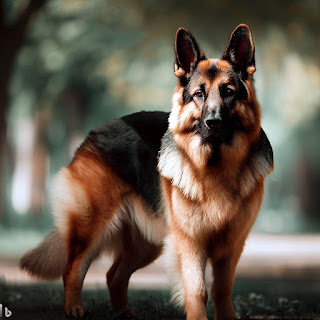German Shepherd | Breed Facts - Knowledgecityfree
German Shepherd Origin, Physical Properties, Mating, Puppies, Black German Shepherd
German Shepherd:
The German Shepherd is an intelligent and adaptable working dog, also known as the Deutscher Schäferhund in German. They are one of the most famous and recognized dog breeds in the world, admired for their bravery, loyalty and keen senses. Originally bred in Germany for herding cattle and sheep, the breed has been widely used in a variety of roles, including police and military work, search and rescue missions, service support and as loving family companions.
Origin:
The German Shepherd breed was developed in the late 19th and early 20th centuries by Captain Max von Stephanitz in Germany. He aimed to create a herding dog with outstanding intelligence and working capacity, capable of herding and protecting livestock effectively. The breed's lineage was refined through careful selection of local herding and ranch dogs, and the breed eventually gained international recognition for its distinctive skill and temperament. its distinctive.
Physical properties:
The German Shepherd Dog is a large dog with strong and agile muscles. They usually have a strong, straight back, well-proportioned head, and expressive black eyes. Their ears are erect and forward, and they have a thick double coat of various colors, most commonly black and fawn, mink or solid black.
Their ears are designed to move and rotate independently, allowing them to locate the source of a sound with remarkable accuracy. German Shepherds have highly sensitive ears that can detect sounds at a wide range of frequencies. They can hear high-pitched sounds that are often inaudible to humans. They can hear sounds with frequencies in the range of roughly 40 Hz to 60,000 Hz.
Height:
Male German Shepherds typically stand between 24 to 26 inches (61 to 66 cm) at the shoulder. Female German Shepherds typically stand between 22 to 24 inches (56 to 61 cm) at the shoulder.
Length:
The body length of a German Shepherd is usually proportionate to their height, ranging from about 34 to 40 inches (86 to 102 cm) from the tip of the nose to the base of the tail.
Weight: Male German Shepherds generally weigh between 65 to 90 pounds (30 to 41 kg). Female German Shepherds typically weigh between 50 to 70 pounds (23 to 32 kg).

Like all dogs, the German Shepherd's diet should include nutritious, balanced foods. High quality commercial dog food, dry or wet, is recommended to provide the nutrients they need for an active lifestyle. In addition, fresh vegetables and fruits can be fed regularly or supplemented, but it is essential to avoid feeding them harmful foods such as chocolate, onions or grapes.
Bite force:

German Shepherds are known for their powerful biting force. While there can be variations between dogs, they generally have a bite force of 238 to 260 pounds per square inch (psi). This strength makes them capable and effective guardians in a variety of job roles.
Speed and Swimming:
German Shepherds are agile and energetic dogs. They can reach speeds of up to 30 miles per hour (48 km/h), which helps them to pursue and capture suspects on the run during police and military work. When it comes to swimming, not all German Shepherds are excellent swimmers, but many can swim when introduced to the water at an early age. However, it is essential to observe them underwater, as not all individuals are good swimmers.
Mating season of German Shepherds:
German Shepherds, like many breeds, typically go through their breeding season, also known as estrus or estrus, twice a year. The exact timing can vary slightly depending on the dog, but it usually happens in the spring and fall. During this period, female German Shepherds become sexually sensitive and may exhibit behavioral changes, such as increased affection for male dogs and increased vocalization.
Pregnancy period:
After a successful mating German Shepherd dog, its gestation period, i.e. the time from conception to delivery, is usually about 63 days (about 58-68 days). During this time, it is essential to provide the right care, nutrition, and veterinary checkups to ensure the health and well-being of the pregnant bitch and her developing puppies.
The number of puppies a German Shepherd bitch (female dog) gives birth to can vary based on several factors, including genetics, age, health, and breeding. On average, a German Shepherd litter typically consists of 6 to 8 puppies.
Diseases:
As with all breeds, the German Shepherd is prone to a number of health problems. Some common health problems include hip and elbow dysplasia, degenerative muscle disease, bloating (gastric torsion), and allergies. Regular veterinary checkups, a healthy diet, and appropriate physical activity can help reduce some of these risks.
Spread of the disease:
German shepherds are not known to transmit diseases directly to humans. However, like all animals, they can carry parasites such as ticks, fleas or certain types of worms, which can endanger the health of the dog and its companions. Maintaining a regular grooming routine and preventing parasites is important to keep your dog healthy and prevent the spread of any potential parasites. In addition, responsible breeding practices can help reduce the risk of passing genetic diseases from generation to generation.
Tooth:
German Shepherds, like all dogs, go through a series of teeth development as they age. They start with baby teeth or baby teeth, which begin to erupt around 3 to 4 weeks of age. These baby teeth will eventually be replaced by permanent teeth. By the age of 6 months, most German Shepherds have grown all their adult teeth. The adult German Shepherd has 42 teeth, including incisors, canines, premolars, and molars.
Claws:
German Shepherds have strong and well-proportioned paws designed to support their active and agile lifestyle. Their feet consist of four toes with thick and durable pads that help them walk and run comfortably on a variety of terrain. The pads also provide some protection against temperature extremes and rough surfaces. The paws of the German Shepherd Dog are an essential part of their physical structure, helping them to perform various labor roles and daily activities.
The following are some special characteristics of German Shepherds:
Intelligence:
The German Shepherd is a very intelligent dog with an excellent ability to learn and follow commands. Their intelligence makes them learn quickly, adapt to different training tasks, and are well-suited to complex tasks in job roles.
Loyalty and Dedication:
German Shepherds form close bonds with their human family and are extremely loyal and devoted. They have protective nature and they can do anything to keep their loved ones safe.
Obey:
When properly trained, German Shepherds show great obedience. They tend to respond to commands and a desire to please their owners, making them ideal for training obedience and agility.
Alert:
As natural guardians, German Shepherds are very alert and attentive to their surroundings. They have strong protective instincts, making them excellent watchdogs, able to detect and alert owners to potential threats.
Happy:
German Shepherds have playful personalities and are full of energy, especially in their early years. They love to play interactively with their owners and can be very enthusiastic and fun loving.
Trust:
This breed is generally confident and self-assured. Their confidence makes them reliable and fearless in various job roles and can be beneficial in highly stressful situations.
socialize:
Early socialization is important for German Shepherds to ensure they become well-adapted and friendly to other animals and people. Good socialization helps prevent shyness or overprotective behavior. Work ethic:
German Shepherds have a serious work ethic that stems from their herding and work background. They thrive when there's a job to do, whether it's herding, training, or performing tasks like service dogs.
Exercise needs:
The German Shepherd Dog is an active and energetic dog that needs regular exercise to maintain physical and mental well-being. Daily walks, playtime and training sessions are essential to maintaining their health.
Family relationship:
German Shepherds tend to be affectionate with their human family. They often form strong bonds with children and can be gentle and protective of them.
Black German Shepherd:
The Black German Shepherd is a variety of the German Shepherd breed that is recognized for its distinctive solid black coat. While German Shepherds are known for their variety of coat colors, including black and tan, black is one of the rarer color variations. Black German Shepherds have the same general characteristics, intelligence, and temperament as other German Shepherds.
It is important to note that individual behavior can vary depending on factors such as training, socialization, and genetics. Responsible ownership, proper training, and regular exercise are key to ensuring German Shepherds exhibit their best behavioral traits and develop into joyful companions, overview.
FAQ:
Q: Is German Shepherd a good pet?
Q: Why German Shepherd is so famous?
A: yes, German Shepherd is good pet. They are Intelligent, Trustable, Loyal, guarding and obey order. These qualities make them a good pet.
Q: Is German Shepherd a friendly dog?
A: The temperament of a German Shepherd can vary depending on factors such as genetics, socialization, and training. In general, German Shepherds are known for being loyal, intelligent, and protective. They often form strong bonds with their families and can be very loving and affectionate.
However, whether a German Shepherd is friendly towards strangers or other animals can vary from one dog to another. Early socialization and proper training play a crucial role in shaping a German Shepherd's behavior. Well-socialized and properly trained German Shepherds are more likely to be friendly and accepting of new people and animals.











Post a Comment